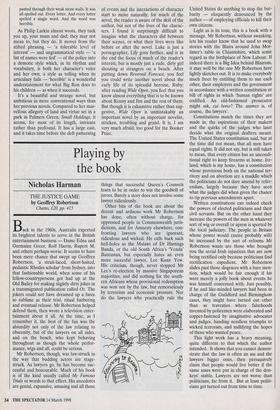Playing by the book
Nicholas Harman
THE JUSTICE GAME by Geoffrey Robertson Chatto,120, pp. 415 Back in the 1960s, Australia exported its brightest talents to serve in the British entertainment business — Dame Edna and Germaine Greer, Rolf Harris, Rupert M, and others perhaps worse. It seems to have been mere chance that swept up Geoffrey Robertson, 'a strait-laced, short-haired, pedantic Rhodes scholar' from Sydney, into that fashionable world, when some of his fellow-countrypersons got had up at the Old Bailey for making slightly dirty jokes in a transmigrated publication called Oz. The jokers could not have dreamed up a farce so sublime as their trial, ritual barbering and eventual release. Mr Robertson helped defend them, then wrote a television enter- tainment about it all. At the time, as I remember it, the best of the fun was the absurdity not only of the law relating to obscenity, but of the lawyers on all sides, and on the bench, who kept behaving throughout as though the whole perfor- mance, wigs and all, could be serious.
Mr Robertson, though, was law-struck in the way that budding actors are stage- struck. As lawyers go, he has become suc- cessful and honourable. Much of his book is of the kind usually called My Famous Trials or words to that effect. His anecdotes are genial, expansive, amusing and all those things that successful Queen's Counsels learn to be in order to win the goodwill of jurors. Barely a story does not involve some lawyer ridiculously.
Other bits of the book are about the decent and arduous work Mr Robertson has done, often without charge, for oppressed people in Commonwealth juris- dictions, and for Amnesty elsewhere, con- fronting lawyers who are ignorant, ridiculous and wicked. He calls back such hell-holes as the Malawi of Dr Hastings Banda, or the old. South Africa's 'Venda' Bantustan, but especially hates an even more succesful lawyer, Lee Kuan Yew. His criticism, though, never stopped Mr Lee's re-election by massive Singaporean majorities, and did nothing for the south- ern Africans whose provisional redemption was won not by the law, but remorselessly by terrorism and economic pressure. Nor do the lawyers who practically rule the United States do anything to stop the bar- barity — eloquently denounced by the author — of employing officials to kill their own citizens.
Light as is its tone, this is a book with a message. Mr Robertson, without swanking, lets his reader know that he used to swap stories with the Blairs around John Mor- timer's table in Chiantishire, which some regard as the birthplace of New Labour. If indeed there is a Big Idea behind Blairism, it may well be the one Mr Robertson here lightly sketches out. It is to make everybody much freer by entitling them to sue each other, their employers and the government in accordance with a written constitution or bill of rights in which 'human rights' are codified. An old-fashioned prosecutor might ask, cui bono? The answer is, of course, the lawyers'.
Constitutions match the times they are made in, the aspirations of their makers and the quirks of the judges who later decide what the original drafters meant. The United States constitution said, but at the time did not mean, that all men have equal rights. It did not say, but is still taken to mean, that every citizen has an uncondi- tional right to keep firearms at home. Ire- land, which is my home, has a constitution whose provisions both on the national ter- ritory and on abortion are a muddle which the politicians do not dare amend by refer- endum, largely because they have seen what the judges did when given the chance to rip previous amendments apart.
Written constitutions can indeed check the powers of elected politicians and their civil servants. But on the other hand they increase the powers of the men in whatever sort of wig or overall or apron is sported by the local judiciary. The people in Britain whose power would (more probably will) be increased by the sort of reforms Mr Robertson wants are those who brought you the serial Irish injustices that are now being rectified only because politicians find rectification expedient. Mr Robertson slides past those disgraces with a bare men- tion, which would be fair enough if his were merely a jolly book about events he was himself concerned with. Just possibly, if he and like-minded lawyers had been in charge of the Guildford and Birmingham cases, they might have turned out other than as travesties where falsehoods invented by policemen were elaborated and copper-fastened by imaginative advocates and judges, handing needless triumphs to wicked terrorists, and nullifying the hopes of those who wanted peace.
This light work has a heavy meaning, quite different to that which the author intended. It shows that you cannot demon- strate that the law is often an ass and the lawyers bigger ones, then persuasively claim that people would live better if the same asses were put in charge of the don- keys' stable. Lawyers are not worse than politicians, far from it. But at least politi- cians get turned out from time to time.


































































 Previous page
Previous page